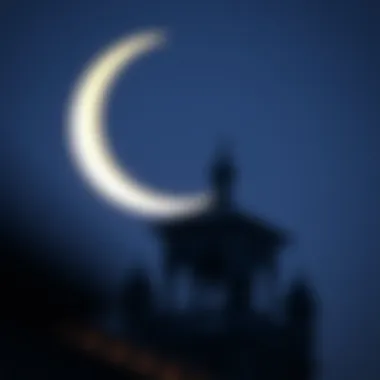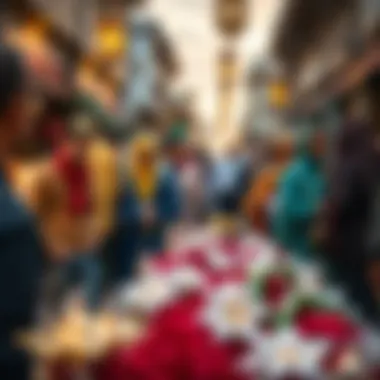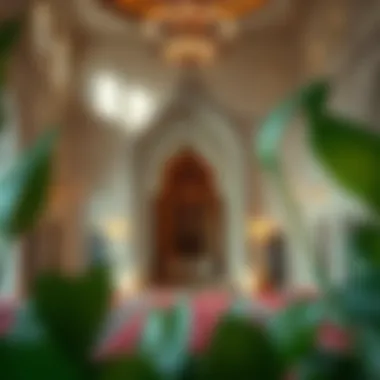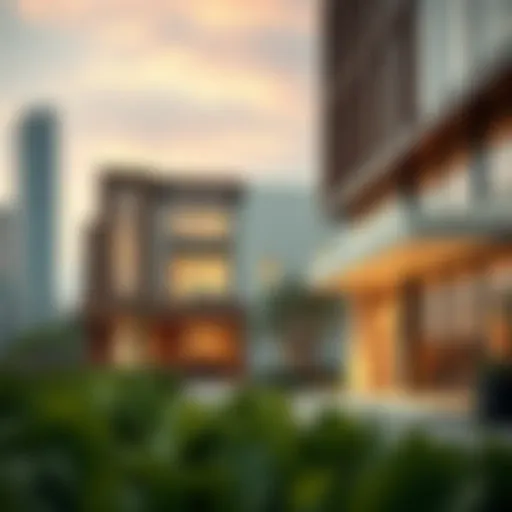Ramadan Dates 2024: Insights for the UAE


Intro
Ramadan, the ninth month of the Islamic lunar calendar, is not only a significant spiritual period but also influences various dimensions of life in the United Arab Emirates, particularly in Dubai. In 2024, the dates for Ramadan are expected to commence around the evening of March 10 and conclude with Eid al-Fitr on approximately April 9. These dates are contingent upon the sighting of the moon, which adds a layer of unpredictability to the exact onset of this holy month.
The importance of Ramadan transcends mere dates; it acts as a catalyst for community bonding, increased charitable acts, and profound spiritual reflection. During this time, businesses and real estate activities perceive notable shifts, prompting investors, homebuyers, and expats to recalibrate their strategies. Communities come alive with nightly prayers and iftars, while a palpable camaraderie sets the backdrop for daily life.
For those in the real estate sphere, understanding the intricate dynamics of Ramadan in 2024 provides an invaluable edge. With cultural practices shaping market trends and lifestyle choices, insights into this holy month become crucial for navigating the UAE's property landscape effectively.
In essence, this comprehensive guide will delve into every aspect of the Ramadan experience in 2024 within the UAE—highlighting market trends, community engagement, and the implications for the real estate sector. Emphasizing unique observations and historical context, readers will find the information both relevant and enlightening as they traverse through this sacred period.
Understanding Ramadan
The significance of Ramadan stretches far beyond mere fasting. It is a month steeped in deep cultural and spiritual meaning for Muslims around the globe. In this article, we will explore numerous facets of Ramadan, especially as they relate to the United Arab Emirates in 2024.
Understanding the intricate layers of this holy month is crucial for a variety of audiences—be it investors eyeing the local markets, expatriates participating in the festivities, or even realtors hoping to attract clientele during this busy period. Ramadan impacts daily life, businesses, and even property dynamics significantly.
Definition and Background
Ramadan is the ninth month of the Islamic lunar calendar, observed by millions as a period of fasting, prayer, reflection, and community. Traditionally, Muslims refrain from eating and drinking from dawn until sunset, with the intention of cleansing the soul and fostering a sense of unity within the community. This custom finds its roots in the Quran, which decrees fasting for those who are able to do so.
The month lasts 29 or 30 days, depending on the sighting of the moon. It often appears to shift each year in the Gregorian calendar, moving approximately ten days earlier annually. This lunar timing creates a unique rhythm; one year, Ramadan may fall during the cooler months, while in another, it could coincide with the summer heat. The varying conditions add layers to the experience of fasting, deepening the communal connections forged through shared challenges and triumphs.
Cultural Significance
Ramadan’s cultural significance can hardly be overstated. It serves as a time to strengthen communal ties, as families come together for Suhoor (pre-dawn meal) and Iftar (meal to break the fast). The hustle and bustle of preparing food and setting the dining table becomes a communal effort, as neighbors often share meals, fostering a spirit of generosity.
Moreover, beyond the table, Ramadan brings about a revitalized focus on spiritual growth. Engaging in acts of kindness, charity, and self-discipline takes center stage. Participants often go out of their way to support those less fortunate, exemplifying the communal ethos enshrined in Islamic teachings. In the UAE, this ethos is celebrated through numerous charitable initiatives and community events, reflecting both the religious significance and the cultural richness of the country.
"Ramadan is the month in which the Quran was revealed; a guidance for mankind and clear proofs for the guidance and criterion, whoever sights (the new moon of) the month, let him fast that month." - (Quran 2:185)
In this sense, understanding Ramadan is essential not just for adherents, but for anyone living in or engaging with culture in the UAE. It highlights respect for traditions, and appreciation for shared values that enhance community life.
As we delve deeper into the specifics of Ramadan 2024 in the following sections, the goal will be to unravel the dates, practices, and social implications, creating a comprehensive narrative that serves various stakeholders invested in the rich tapestry of life during this holy month.
Lunar Calendar and Ramadan Dates
The lunar calendar plays a central role in the determining the timings of Ramadan, a holy month for Muslims. Unlike the Gregorian calendar that most of the Western world observes, the lunar calendar is based on the phases of the moon. This distinction is crucial not just for religious observance but also for various aspects of daily life in the UAE. Understanding how this calendar functions helps individuals and businesses prepare for changes throughout the year, especially during Ramadan.
How Lunar Calendar Works
The lunar calendar consists of 12 months totaling approximately 354 days, which is shorter than the solar calendar by about 11 days. Each month begins with the sighting of the new moon, making it quite different from fixed-date calendars. Here’s how it shakes down:
- Each month lasts either 29 or 30 days.
- Adjustments are made based on moon sightings, which can result in slight variations in dates from one country to another.
- This periodic slipping of dates (about 10-12 days earlier each year) causes Ramadan to shift through the seasons over a span of about 33 years.
Because of this unique aspect, planning for Ramadan can be tricky. For instance, if Ramadan starts in the spring one year, it will be in the winter about a decade later. Such shifts can significantly affect how the fast is observed, as longer daylight hours in summer mean longer fasting periods.
Determining Ramadan Start Date in
In 2024, Ramadan is expected to commence in the evening of Sunday, March 10, subject to the sighting of the moon. Authorities usually convene to confirm the sighting, and once the new moon is seen, the official announcement is made. This systematic approach lends a communal feel to the beginning of Ramadan across the UAE.
- Based on previous years: By consulting lunar calendars and astronomical data, many predict the start date months in advance.
- Flexible: Given its dependence on sighting, the exact starting date may vary. It’s wise for individuals and businesses to stay tuned to announcements.
Expected End Date and Eid al-Fitr
Ramadan typically lasts about 29 to 30 days, culminating in Eid al-Fitr, a significant celebration marking the end of fasting. In 2024, Eid al-Fitr is anticipated to fall on Tuesday, April 9. As with Ramadan's beginning, the dates for Eid can also adjust slightly based on lunar observations.
- Celebrations: Eid al-Fitr involves special prayers, festive meals, and giving of gifts, particularly the Zakat al-Fitr, a charitable donation meant to aid the less fortunate.
- Community Gatherings: Families and friends come together, often enjoying lavish feasts, highlighting the communal values emphasized during Ramadan.
Knowing the expected dates for Ramadan and Eid al-Fitr helps in planning ahead, both personally and professionally.
In summary, the lunar calendar profoundly impacts how Ramadan is observed in the UAE. The shifting dates offer unique challenges and opportunities for cultural engagement, religious observance, and economic activity as we prepare to embrace this sacred month.


Ramadan in the UAE
Ramadan holds a place of profound importance in the United Arab Emirates, shaping the cultural fabric of the nation and influencing the day-to-day lives of its residents. This holy month is not just about fasting; it encompasses a time of reflection, spirituality, and community bonding. In a country that is home to a diverse population, Ramadan stands out as a unifying experience, emphasizing solidarity among Muslims and inviting everyone, regardless of their faith, to acknowledge and respect the values of this sacred period.
The impact of Ramadan in the UAE extends well beyond individual practices of prayer and fasting. The atmosphere in cities like Dubai and Abu Dhabi transforms dramatically during this month. Streets are adorned with lights, iftar tents emerge, and families and friends gather around tables bursting with traditional dishes to break their fast at sunset. The sheer energy and vibrancy of this time create a sense of anticipatory joy—something eagerly awaited by many.
Unique Aspects of Ramadan in the UAE
One of the most remarkable features of Ramadan in the UAE is how it has been embraced through local customs and traditions, mixing modernity with heritage. For instance, while traditional meals like harees and marchouka are often served, contemporary fusion dishes also emerge, reflecting the multicultural makeup of the population. As evenings fall, iftar gatherings become opportunities for culinary creativity, where families might pair traditional foods with international treats.
Moreover, during Ramadan, numerous charitable initiatives are launched throughout the UAE. Organizations and businesses often contribute to food drives, and it is common for meals to be distributed to those in need. This is an integral part of Ramadan's ethos of generosity and community spirit, inspiring individuals to consider the less fortunate with deep empathy.
In addition to the communal gatherings, special events such as Ramadan markets and cultural programs flourish, showcasing local art, food, and customs. These celebrations not only enhance the festive atmosphere but also provide platforms for expats and tourists to learn about Arab culture in a hands-on way.
Regional Variations in Observance
Observance of Ramadan can vary notably across different emirates within the UAE. While the core tenets of fasting remain constant, local customs and practices often reflect the unique cultural dynamics of each region. For example, in Dubai, you may find a bustling nightlife characterized by late-night markets and social events, while in quieter emirates like Fujairah, the atmosphere might lean towards more subdued and family-oriented gatherings.
Additionally, the influence of expatriate communities in major cities has resulted in an adaptation of Ramadan observances. Many non-Muslims actively participate in iftar by joining their Muslim friends and colleagues, fostering intercultural dialogue and understanding. The presence of diverse global cuisines in iftar menus represents an appealing mix of cultures, offering a delightful culinary experience.
In contrast, some traditional practices prevail in less urbanized areas, where locals often emphasize maintaining longstanding cultural traditions throughout the month. For instance, drum ceremonies that announce the time for suhoor—pre-dawn meal—are a nostalgic part of some communities' observances.
Through this rich tapestry of customs and practices, Ramadan in the UAE stands as a vivid reminder of the region's historical depth and social harmony, making it a time of reflection, compassion, and connection that resonates deeply within the heart of the nation.
Impact of Ramadan on Daily Life
Understanding how Ramadan affects daily life in the UAE goes beyond fasting; it permeates culture, community, and commerce. With this holy month approaching in 2024, those living or visiting will experience a unique transformation in lifestyle and routines that provides both challenges and opportunities. Grasping these impacts not only promotes respect for cultural practices but also aids in planning daily activities, whether one is an investor, a realtor, or simply seeking to navigate life in Dubai.
Altered Lifestyle and Routines
During Ramadan, the very fabric of daily life in the UAE is beautifully woven with threads of spirituality and communal bonding. One of the most significant changes is the alteration in daily routines. Fasting from dawn till dusk leads to a shift in meal patterns; breakfast is replaced by Suhoor, the pre-dawn meal, typically shared with loved ones. The time for Iftar, the evening meal to break the fast, becomes a sacred ritual, often involving family gatherings and communal feasts. This shift means errands, work schedules, and even school timings adjust to accommodate the fasting hours.
Public establishments usually adapted their hours to align with the rhythm of Ramadan, creating an environment where the focus is on prayer, reflection, and community. Companies might shorten workdays, leading to increased productivity in a different format. Even the health sector sees shifts, as many choose to seek medical advice for how to maintain energy levels while fasting, and fitness centers often modify their schedules to offer sessions tailored for those engaging in post-Iftar workouts.
Ultimately, understanding these changes can be a game-changer for newcomers or those reassessing their lifestyles.
Community and Family Gatherings
Family and community gatherings take center stage during Ramadan. There's a palpable sense of togetherness that fills the air through shared meals and community events. As the sun sets, streets buzz with families gathering for shared Iftar meals, which creates an atmosphere of unity. The inviting aroma of traditional dishes fills homes and public spaces alike, as people come together to break their fasts.
This month also serves as a time for charitable activities, known as Zakat, where many engage in giving to those less fortunate. Local mosques and community centers often organize events that bring people together to support charitable causes, establishing a community bond that transcends individual circumstances.
Engaging in these activities not only fosters personal connections but also instills a deep sense of gratitude and appreciation for communal life during this sacred month.
Salah (Prayer) Adjustments
For many practicing Muslims, Salah, or prayer, takes on heightened importance during Ramadan. Typically, five daily prayers continue, but special nightly prayers called Taraweeh become a highlight of the month, offered in congregation to foster a spirit of unity. These prayers can extend late into the night, transforming the landscape of the city as mosques fill with worshippers.
People adjust their schedules to prioritize these prayer times, which might mean taking breaks from work or modifying social plans. It’s not uncommon for offices or companies to incorporate time for prayer within the workday, reflecting a respectful acknowledgment of the month’s significance.
Ultimately, the adjustments in Salah routines highlight a collective commitment to faith and community, enhancing the spiritual experience of Ramadan and reinforcing the cultural significance of this holy month.
“Ramadan is a month of spiritual reflection, self-discipline, and devotion. It’s a time to strengthen bonds with family and community.”
In essence, grasping the implications of Ramadan on daily life adds depth of understanding to the UAE's rich cultural landscape, showcasing how faith, community, and commerce intertwine beautifully to create a unique living experience.
Business Considerations During Ramadan
During Ramadan, businesses in the UAE face unique challenges and opportunities that demand a nuanced understanding of the month’s cultural and social implications. Recognizing these factors is crucial not only for maintaining operational efficiency but also for nurturing relationships with customers and clients during this holy month. Understanding the subtleties of how business practices shift can ultimately lead to a more harmonious engagement with the broader community, which remains a priority during this sacred time.
Business Hours and Operations
Ramadan brings about a shift in typical business hours across the UAE. Many workplaces adjust their schedule to accommodate the fasting hours of employees. A common trend is to reduce working hours, often condensing a full day into six hours, typically starting later in the morning. This change is important; companies like Emirates Airlines and Etisalat are known to adopt these practices, allowing their employees to break their fast with family or friends.


- Flexible Timing: It’s crucial for employers to embrace flexibility, setting a work schedule that aligns comfortably with prayer times and iftar meals.
- Remote Work Considerations: With some firms choosing to implement remote work policies, especially for their expat workforce, understanding individual employee challenges—like managing work-life balance—remains paramount.
In short, understanding and adapting to these changes can mitigate disruption while enhancing employee morale and productivity during the fasting month.
Effect on Economic Activity
The economic landscape often sees a unique rhythm during Ramadan. While some sectors may experience a slowdown, others thrive. For example, retail businesses often see a surge in consumer spending as people stock up on food, clothes, and gifts. Restaurants and supermarkets prepare for a bustling evening crowd as families come together for iftar.
- Shift in Purchasing Patterns: Consumers tend to place a higher value on food and entertainment during Ramadan. The increase in foot traffic in shopping malls is notable, especially leading up to Eid al-Fitr as people prepare for celebrations.
- Real Estate Insights: Interestingly, the real estate market also experiences fluctuations. Investors may notice a temporary pause in transactions, yet it’s also an opportunity for sellers to display properties, especially if they’re staged to reflect the festive spirit of the month.
Understanding these seasonal shifts allows businesses to strategize effectively and cater to new consumer needs during this month.
Strategies for Businesses
The influence of Ramadan on commerce calls for innovative approaches to business strategies. Engaging with the community through culturally aligned initiatives can enhance brand loyalty.
- Community Outreach: Many businesses find success in sponsoring iftar events or donating meals to those in need, which resonate well with the values of Ramadan. This not only showcases corporate social responsibility but also fosters goodwill among customers.
- Tailored Marketing Campaigns: Developing marketing strategies that resonate with the themes of Ramadan—such as family, community, and spirituality—can effectively engage consumers at this time. Social media campaigns that share iftar recipes or highlight local cultural events can create deeper connections.
- Incentives and Promotions: Offering promotions or discounts during Ramadan can encourage spending and attract customers. For instance, limited-time offers for traditional foods or festive products can draw in larger audiences.
By incorporating these strategies, businesses in the UAE can not only navigate the complexities of Ramadan but also leverage its cultural richness to build lasting relationships with their customers.
"Business during Ramadan is not just about generating revenue. It’s about connecting with the community and embracing the spirit of this special month."
Real Estate Market Dynamics During Ramadan
The dynamics of the real estate market in the UAE during Ramadan present a unique blend of opportunities and challenges. The holy month influences various aspects of life, and real estate is no exception. Understanding how Ramadan shapes buyer behavior, investment trends, and overall market sentiment is crucial for anyone involved in the sector.
In general, the month tends to slow down conventional buying and selling processes. However, those looking to invest may find that Ramadan offers various advantages that might not be as evident during other times of the year.
Property Investment Trends
During Ramadan, property investors start revisiting portfolios to assess potential opportunities. It's not merely about purchasing; it's about understanding the rhythms of the market.
- Increased Demand for Rental Properties: As expats often seek short-term rentals, there is usually a spike in demand for furnished apartments during Ramadan because many families wish to celebrate Iftar with friends or relatives.
- Focus on Community and Family Homes: Properties that are spacious and conducive to family gatherings can see increased attention. Investors looking to tap into this sentiment might aim for units near mosques and community centers, appreciating their significance to potential renters.
- Marketing Adjustments: Savvy realtors might adapt marketing strategies to include Ramadan themes in their advertising, emphasizing the importance of community and family during the month.
Opportunities for Buyers and Sellers
Sellers can experience a slowdown but with the right strategy, they can still make headway. Here are some considerations:
- Leveraging Ramadan Promotions: Some developers and real estate agents introduce limited-time promotions during this period. For buyers, this could translate to appealing deals and more flexible payment options.
- Quiet Market: While some buyers may be deterred by Ramadan’s fasting hours, the lack of competition can work in favor of serious buyers. Those who are motivated can find good deals as sellers may be more willing to negotiate.
- Networking Opportunities: Ramadan is often a time for increased networking opportunities. Open houses and community events can foster better connections and lead to potential deals that might not be attainable in a more bustling market.
The market dynamics during Ramadan are intricate and layered. Investors and homebuyers must navigate this complex terrain with an understanding of the cultural significance attached to the month.
"Understanding how Ramadan affects the market can offer investors unique insights that might lead to fruitful opportunities."
For more details, check resources from Britannica for historical context and cultural significance, or explore community events on Facebook to see potential engagement during Ramadan.
Navigating Life in Dubai During Ramadan
Navigating daily life in Dubai during Ramadan is an experience shaped by a blend of cultural respect and community celebration. As the city embraces the holy month, both residents and expatriates find themselves needing to adjust their routines and interactions with one another, making it essential to understand the nuances involved.
Tips for Residents and Expats
For those living in Dubai—be they long-term residents or newcomers—understanding Ramadan's rhythm can greatly enhance the experience. Here are some practical tips to consider:
- Adjusting Meal Times: The fasting hours can shift daily, but generally, the fast begins at dawn and concludes at sunset. It’s common to have a meal before the sun rises (Suhoor) and another meal after it sets (Iftar). Be sure to adjust your eating schedule accordingly.
- Being Mindful of Public Behavior: During Ramadan, it’s vital to be respectful of those who are fasting. Eating, drinking, or smoking in public places during daylight hours can be seen as inconsiderate. If you need refreshments, look for designated areas in restaurants or cafes that may cater to those non-fasting.
- Planning Activities Wisely: Consider shifting your work or social activities to the evening hours. Many social gatherings and events take place after Iftar, which can be a wonderful time to connect with friends and family.
- Traffic and Transportation: Be prepared for changes in traffic patterns, especially around Iftar, as people rush to break their fast. Allocating extra travel time can save frustration when heading to meetings or gatherings.
- Consider Volunteering: Engaging in community service during this time can be incredibly fulfilling. Many organizations host food drives or charity events, especially aimed at aiding those in need. Expats often find these activities help foster a deeper connection to the community.
Participating in Local Community Events
Getting involved in community events can heighten the experience of Ramadan. Here are ways to dive into local traditions:
- Iftar Venues: Many hotels and restaurants in Dubai host grand Iftar buffets featuring traditional dishes. Reservations are often recommended, so try booking in advance to secure a spot.
- Cultural Festivals: During Ramadan, several cultural events take place, celebrating Islamic art, music, and lifestyle. These often include exhibitions, workshops, and performances that provide insight into the rich traditions associated with Ramadan.
- Night Markets: Various night markets spring to life during Ramadan, offering everything from food to crafts. They are great spots for enjoying the festive vibe, sampling local dishes, and shopping.
Community participation not only enriches personal experiences but also broadens understanding of the deep-rooted traditions associated with Ramadan in Dubai.


Engaging in the local culture can bridge gaps between diverse backgrounds and create a softer, welcoming atmosphere. Each invitation to share in these events provides a chance to unite with others in celebration and reflection during this sacred time.
Cultural Sensitivity and Ramadan Etiquette
As Ramadan approaches, understanding cultural sensitivity and the associated etiquette becomes paramount, especially within the diverse landscape of the UAE. This concept isn’t merely about following rules; it encompasses respect for traditions, compassion towards others, and a willingness to embrace the spirituality that this holy month invites.
Respecting Fasting
One of the fundamental aspects of Ramadan is fasting from dawn to dusk. For Muslims, this practice is a spiritual journey that requires more than just abstaining from food and drink. It’s about self-discipline and personal growth. Non-Muslims and even those who may not be participating in the fast can still play a significant role through respect and understanding.
- Avoid eating or drinking in public: This is a visible way to show respect for those who are fasting. Even with the heat of Dubai, it’s crucial to keep water bottles and snacks out of sight.
- Be considerate with scheduling: If you’re planning meetings or gatherings, consider timing them outside of iftar, the meal that breaks the fast, which happens at sundown. This window allows for a peaceful time to connect and celebrate afterward.
- Educate yourself: Familiarizing yourself with the reasons behind fasting can create a deeper appreciation. This resonates well especially as you might interact with local colleagues or friends who observe Ramadan.
Customary Practices and Observances
Ramadan is not just about fasting; it's also a rich tapestry of customs and community observances. Understanding these practices will ease integration into local life and enhance relationships within the community.
- Iftar gatherings: Sharing iftar meals is a tradition that promotes communal bonds. If invited, consider attending. It’s a wonderful opportunity to learn about local customs and, perhaps, try delicious traditional dishes like dates and Arabic coffee.
- Community service: Many individuals engage in charitable acts during Ramadan, believing it heightens spiritual rewards. Engage with local charities or support food drives, showing benefit to the community while respecting the values inherent in this time.
- Dress modestly: This is particularly important during Ramadan. A respectful appearance signals awareness and appreciation for cultural norms, making for an amicable coexistence during this holy month.
"Cultural sensitivity fosters a sense of belonging and reinforces the bridges between different communities during Ramadan."
Navigating the environment during Ramadan requires attentiveness and an open heart. As an investor, homebuyer, realtor, or any professional interacting with the UAE landscape, these simple courtesies not only reflect well on personal character but can also open doors to meaningful relationships that are cultivated through mutual respect.
Holidays and Celebrations Following Ramadan
The period following Ramadan is just as critical as the month itself, representing a time of joy, gratitude, and community. It marks the transition from a month of fasting and reflection to a period of celebration, allowing individuals and families to express their spirituality in a more communal, festive manner. In the UAE, these holidays provide not only a break from routine but also a chance to strengthen bonds with family and friends.
Understanding Eid al-Fitr
Eid al-Fitr, often referred to simply as Eid, is the most significant event that follows Ramadan. The celebration signals the end of the fasting period and emphasizes gratitude to Allah for the strength to fast and complete the month of Ramadan. This joyous day occurs on the first day of Shawwal, the tenth month of the Islamic calendar.
Traditionally, the day kicks off with a special prayer at mosques and open places. Many Muslims don their best clothes, often new, symbolizing a fresh start. It is common practice to give Zakat al-Fitr, a form of charity, enabling those in need to partake in the Eid celebrations. Here are some key aspects of Eid al-Fitr in the UAE:
- Special Prayers: Early morning prayers gather communities together, fostering unity and shared spiritual experience.
- Gastronomic Delights: Families prepare and share intricate meals, often featuring dates, sweets, and local dishes.
- Gifts and Cards: It’s customary to exchange gifts, particularly among children, fostering a sense of giving and community spirit.
- Cultural Events: Cities often host various events, from fireworks to food festivals, enhancing the festive atmosphere.
Post-Ramadan Festivities
The festivities don’t end with Eid. In fact, the days following Eid offer an extended chance for celebration. Families might travel or host gatherings, ensuring that the spirit of togetherness remains alive. Various traditions can be observed during this time:
- Visiting Family: Many people take time to visit family members and friends, rebuilding connections and indulging in shared meals.
- Charity Events: Beyond Zakat, many individuals and organizations come together for community service, reflecting the spirit of giving initiated by Ramadan.
- Cultural Events: Museums and cultural institutions often host special programs, highlighting local traditions that emphasize community and heritage.
This period is crucial not just for spiritual fulfillment but also for social cohesion, reinforcing the values of charity, gratitude, and human connection that Ramadan embodies. As one can see, the days after Ramadan hold substantial significance and are deeply rooted in the culture and practices of the UAE, providing opportunities for both personal reflection and communal celebration.
"Eid is not just a celebration but a reminder of the bonds that tie us to our families, community, and faith."
Among the various customs, it’s evident that the sense of community becomes even more pronounced following Ramadan, turning the month’s dedication into a foundation for ongoing relationships and social understanding.
The End
The conclusion of this article encapsulates the multifaceted nature of Ramadan in the UAE, especially focusing on the Ramadan dates of 2024. Understanding how Ramadan impacts not just spiritual practices but daily living, social interactions, and economic activities is crucial for everyone, be they locals or expats. The communal spirit of Ramadan fosters a sense of unity and moral reflection that extends beyond just the act of fasting. The changes in business operations and the dynamics of the real estate market provide investors and homebuyers with valuable insights.
Here are some key elements to consider regarding the importance of this section:
- Community Engagement: Ramadan emphasizes the importance of family and community. It's a time when people come together, fostering a strong sense of belonging.
- Economic Implications: The holy month can directly affect business hours and strategies, which influences how local and international businesses operate in the UAE.
- Real Estate Considerations: Investors need to understand how market dynamics shift during Ramadan. Keeping an eye on investment trends during this period can yield promising opportunities.
"It is not just about abstaining from food; it's about fostering deeper connections and understanding within the community."
By reflecting on these aspects, readers gain a comprehensive view that will aid them in navigating Ramadan effectively, making informed decisions, and enriching their lives during this significant month.
Summary of Key Points
- Ramadan Dates: In 2024, Ramadan is expected to begin on the evening of March 11 and end on April 9, culminating in Eid al-Fitr. Accurate timings will depend on moon sightings.
- Cultural Richness: The season embodies a spiritual reflection and social solidarity unique to the region, with practices varying among communities, yet sharing the core of fasting and prayers.
- Impact on Daily Life: Lifestyle adjustments are significant during Ramadan, affecting prayer times, business operations, and social interactions.
- Economic Dynamics: Businesses often adapt to the holy month through adjusted hours, promotions, and strategies that resonate with the community’s spirit.
- Real Estate Market Shifts: Observing property investment trends during Ramadan can open avenues for wise decision-making and potential growth in assets.
Looking Ahead to Future Ramadans
As Islamic calendar months are based on lunar sightings, the dates of future Ramadans will continue to shift. Looking ahead to 2025, Ramadan may commence around March 1. This predictability, however, brings both opportunities and challenges for investors and community members alike. Some considerations for future iterations include:
- Increased Focus on Sustainability: There's a growing trend to celebrate Ramadan in environmentally friendly ways. Future observances might see enhanced community initiatives promoting sustainability.
- Evolving Business Strategies: As consumer preferences continue to change, businesses must adapt their offerings and marketing strategies to align with new cultural sensitivities evolving over time.
- Community Engagement: The drive for inclusivity could strengthen communal activities and partnerships between businesses and residents, enhancing the collective experience of Ramadan.
Understanding these trends not only provides context but also serves to prepare stakeholders for upcoming transitions, ensuring that they can make the most of each Ramadan. The blend of cultural heritage, economic implications, and community spirit creates a rich tapestry that is not only about fasting but about growth and unity.













